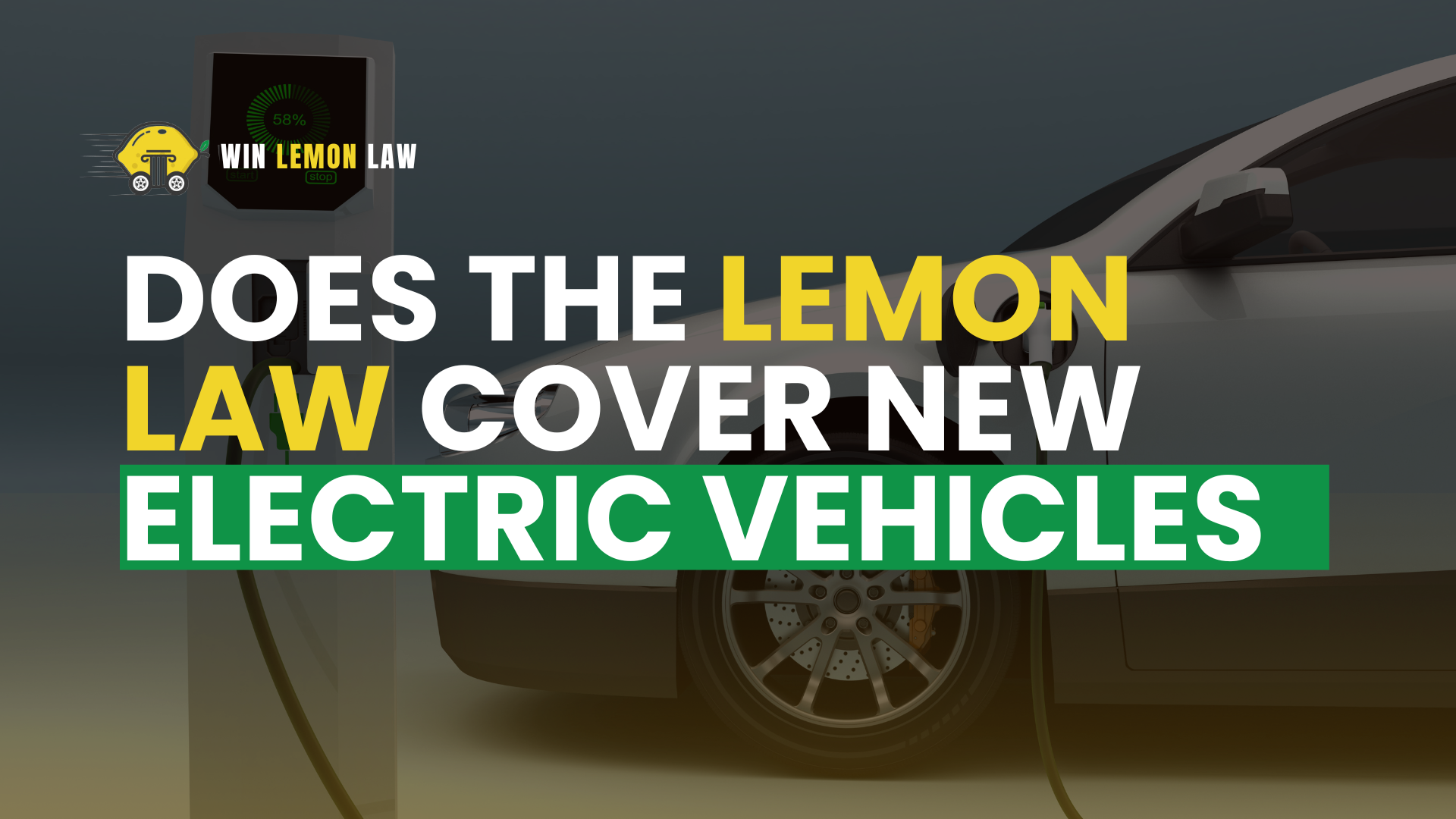Buying a new electric vehicle (EV) is exciting. The thrill of driving a sleek, eco-friendly car with cutting-edge technology is unparalleled. However, this excitement can quickly turn into frustration if your new EV starts to show defects. Whether it’s a malfunctioning battery, software glitches, or issues with the charging system, these problems can significantly impact your vehicle’s performance and reliability.
So, what happens if your shiny new EV has persistent issues that the manufacturer can’t fix? This is where lemon laws come into play. Lemon laws are designed to protect consumers from defective vehicles, ensuring you’re entitled to a replacement or refund if your vehicle consistently fails to meet standards of quality and performance. But do these laws apply to electric vehicles in the same way they do to traditional gasoline-powered cars?
In this post, we’ll explore how the Lemon Law covers new electric vehicles, the common issues that can affect EVs, and the steps you should take if you believe your EV is a lemon. Read on to learn more about your rights as an EV owner and how to navigate the lemon law process effectively.
Do Lemon Laws Apply to Electric Vehicles?
Absolutely, the Lemon Law covers electric vehicles (EVs) just like traditional gasoline-powered vehicles. These laws are designed to protect consumers who purchase new vehicles with significant defects that the manufacturer or dealer cannot fix after a reasonable number of attempts. Here’s how lemon laws apply to EVs and what you need to know:
Criteria for a Vehicle to be Considered a Lemon
For an EV to be classified as a lemon, it generally must meet the following criteria:
Significant Defects: The vehicle must have substantial defects that affect its safety, value, or functionality. These defects are not minor issues but rather major problems that impair the use of the vehicle.
Repair Attempts: The manufacturer or dealer must have made multiple attempts to repair the same defect without success. The exact number of repair attempts required can vary by state, but it typically ranges from three to four attempts for the same issue.
Time Out of Service: Alternatively, if the vehicle is out of service for an extended period due to repairs—usually 30 days or more within the first year or during the warranty period—it may also qualify as a lemon.

Common Defects in Electric Vehicles
EVs can experience a range of defects that qualify under lemon laws. Some of the most common issues include:
Battery Problems: Battery defects can severely impact the range and charging capabilities of an EV. Issues such as rapid battery depletion, inability to hold a charge, or overheating are significant concerns.
Software Malfunctions: EVs rely heavily on sophisticated software to manage everything from navigation to driving dynamics. Software glitches or failures can lead to problems with the vehicle’s operation, affecting everything from infotainment systems to critical safety features.
Charging System Failures: Problems with the vehicle’s charging system, such as incompatibility with charging stations, faulty charging ports, or slow charging times, can render the EV impractical to use.
Electrical System Issues: Defects in the vehicle’s electrical system can lead to problems with lighting, power windows, and other electronic components, affecting the overall functionality of the car.
State-Specific Lemon Laws

Lemon laws vary significantly from state to state, with specific requirements and processes for filing claims. Key variations include the number of repair attempts required, the duration a vehicle must be out of service, and the time limits for filing a claim. States typically require three to four repair attempts for the same defect, and some mandate providing the manufacturer a final opportunity to repair the vehicle
The minimum duration a vehicle must be out of service is generally around 30 days, though this can differ, and some states consider consecutive versus non-consecutive days differently. Filing deadlines often fall within the first 18 months or 18,000 miles, with statutes of limitations ranging from one to four years. While most states’ lemon laws cover new vehicles, some also include used or leased vehicles, and coverage may extend to motorcycles, RVs, and boats in certain states.
Additionally, some states require mandatory arbitration before pursuing a lawsuit, while others offer voluntary arbitration. To navigate your state’s lemon law, familiarize yourself with its specific provisions through your state’s Attorney General’s website, local consumer advocacy groups, and lemon law attorneys, and stay updated on any changes to ensure you have the most current information.
Federal Lemon Law Protection
In addition to state lemon laws, there is also federal protection under the Magnuson-Moss Warranty Act. This act applies to any product that costs more than $25 and comes with a warranty, providing additional recourse for consumers dealing with defective vehicles, including EVs.
Importance of Documentation
To strengthen your lemon law case, maintaining detailed records is essential. Here are some tips:
Keep All Receipts and Repair Orders: Every time you take your EV for repairs, ensure you get a detailed receipt or repair order that documents the issue and the work performed.
Track Communication: Document all communications with the manufacturer or dealer, including emails, phone calls, and in-person meetings. Note the dates, times, and contents of these interactions.
Record Downtime: Keep a log of the days your vehicle is out of service due to repairs. This information is crucial if you need to demonstrate that your vehicle has been unusable for an extended period.
Seeking Legal Assistance
Navigating lemon law claims can be complex, especially with the added intricacies of EV technology. Here’s how an attorney can help:
Expert Evaluation: A lawyer specializing in lemon law can evaluate your case to determine if your EV meets the criteria for a lemon.
Negotiation: Attorneys can negotiate with the manufacturer on your behalf to seek a fair settlement, whether it’s a replacement vehicle, a refund, or a cash compensation.
Legal Representation: If your case needs to go to court, having an experienced attorney will ensure you have the best possible representation.

Steps to Take If Your EV Is a Lemon
To protect yourself, keep detailed records of all repairs and communications with the manufacturer or dealer. Documenting these interactions is crucial to proving your EV qualifies as a lemon. Understand your state’s specific lemon laws, as requirements and processes vary.
Key Steps:
Document Everything
- Keep Records of Repairs: Each time your EV is serviced, obtain detailed repair orders and receipts that describe the problem and the repairs attempted.
- Log Communications: Maintain a log of all interactions with the manufacturer or dealer, including phone calls, emails, and in-person visits. Note the dates, times, and details of each communication.
- Track Vehicle Downtime: Document the number of days your EV is out of service due to repairs. This is critical if your state’s lemon law criteria include the vehicle being out of service for a certain number of days.
Understand Your State’s Laws
- Research State Requirements: Lemon laws vary by state, including the number of repair attempts allowed and the required duration of downtime. Familiarize yourself with your state’s specific lemon law provisions.
- Know Your Timelines: Each state has specific timelines within which you must file a lemon law claim. Ensure you are aware of these deadlines to avoid missing the window for legal action.
Seek Legal Advice
- Consult an Attorney: Consider consulting a lawyer who specializes in lemon law cases. An experienced attorney can evaluate your case, guide you through the process, and represent you in negotiations or court if necessary.
- Understand Your Options: A lawyer can help you understand the possible outcomes, such as a vehicle replacement, refund, or cash settlement, and advise you on the best course of action.
Additional Steps
- Send a Formal Complaint: If your vehicle continues to have issues after multiple repair attempts, send a formal complaint to the manufacturer. Include all documentation and state that you believe your vehicle qualifies as a lemon.
- Request Arbitration: Some states require or offer an arbitration process before taking legal action. Arbitration can be a quicker, less formal way to resolve disputes with the manufacturer.
- Prepare for Potential Litigation: If arbitration or direct negotiations with the manufacturer do not resolve the issue, you may need to prepare for litigation. Your attorney will guide you through this process, gathering evidence and building your case for court.

Closing
At Win Lemon Law, we specialize in helping consumers get the justice they deserve. If your new electric vehicle is giving you trouble, don’t hesitate to reach out. Our experienced team can guide you through the lemon law process and fight for your rights.
Why Choose Win Lemon Law?
- Expertise in Lemon Law: Our team has extensive knowledge and experience in handling lemon law cases, specifically for electric vehicles. We understand the unique challenges EV owners face and are equipped to provide the best possible legal support.
- Personalized Service: We offer personalized attention to each case, ensuring that you receive the dedicated support and representation you deserve.
- Proven Track Record: With a history of successful outcomes, we have helped numerous clients secure replacements or refunds for their defective vehicles.
If you believe your electric vehicle is a lemon, don’t wait to take action. Contact Win Lemon Law today to schedule your free consultation.
Let us help you get back on the road with confidence and peace of mind.

